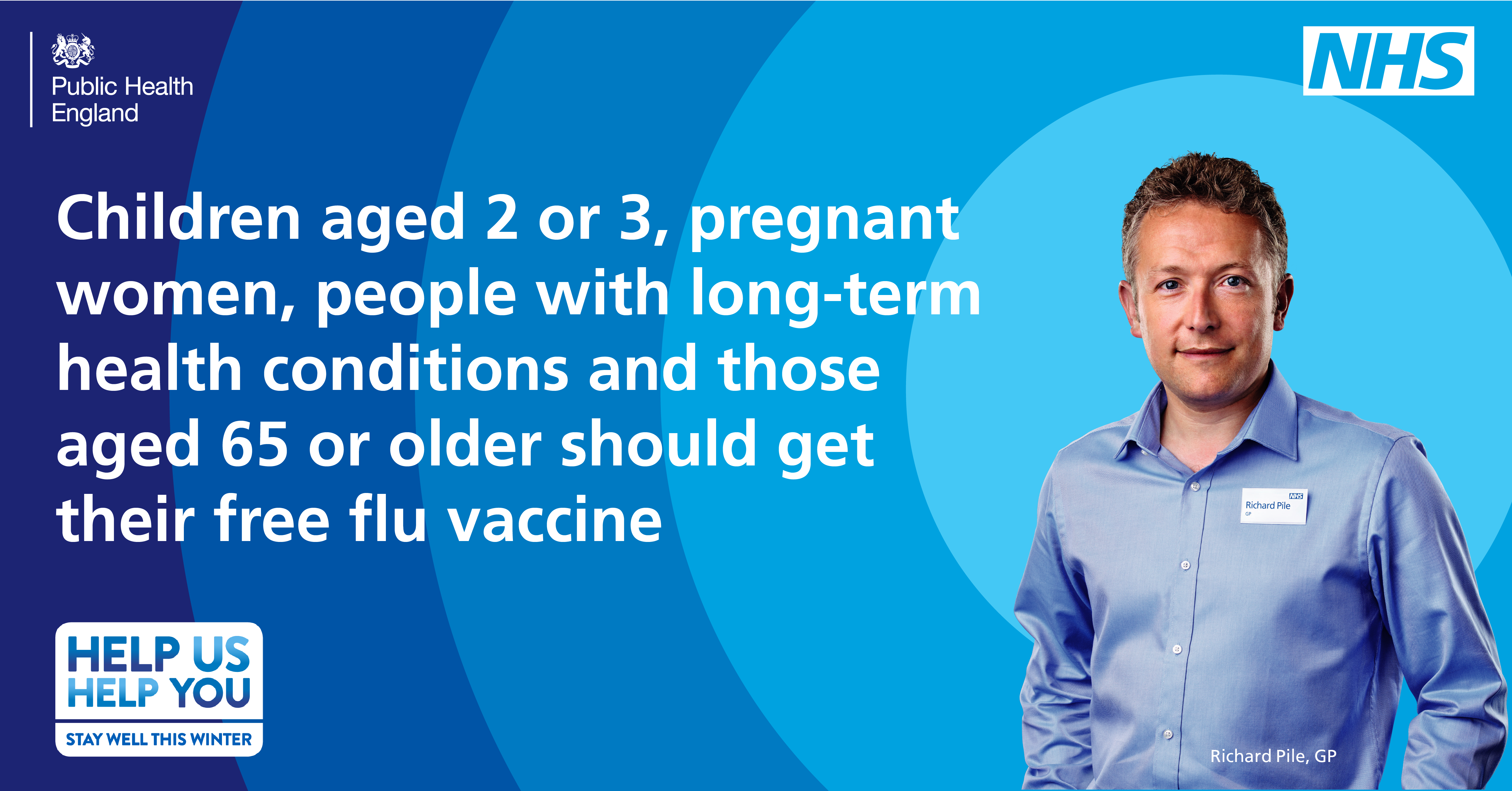
Flu occurs every year – it is a highly infectious disease with symptoms that come on very quickly. Healthy individuals usually recover within two to seven days but for some, the disease can lead to hospitalisation, permanent disability or even death.
Flu can affect anyone but if you have a long-term health condition the effects of flu can make it worse even if the condition is well managed and you normally feel well.
Who should consider having a flu vaccination?
You should have the free flu vaccine if you are:
- Pregnant
- Have a chronic health condition such as a heart problem, a chest complaint or breathing difficulties, a kidney disease, lowered immunity due to disease or treatment, liver disease, had a stroke or transient ischaemic attack, diabetes, a neurological condition, a problem with your spleen or have had your spleen removed, or are seriously overweight (BMI >40)
- Aged 65 years or over
- Living in a residential or nursing home
- The main carer of an older or disabled person
- A household contact of an immnocompromised person
- A frontline health or social care worker
- Children of a certain age (see below)
I am pregnant. Do I need a flu vaccination this year?
Yes. All pregnant women should have the flu vaccine to protect themselves and their babies. The flu vaccine can be given safely at any stage of pregnancy, from conception onwards.
I had the flu vaccination last year. Do I need another one this year?
Yes; the flu vaccine for each winter helps provide protection against the strains of flu that are likely to be present and may be different from those circulating last year.
I think I have already had the flu, do I still need a vaccination?
Yes; other viruses can give you flu-like symptoms, or you may have had flu but because there is more than one type of flu virus you should still have the vaccine.
What about my children? Do they need the vaccination?
If you have a child over six months of age who has one of the long term health conditions listed above, they should have the flu vaccination. All these children are more likely to become severely ill if they catch flu, and it could make their existing condition worse.
The flu vaccine does not work well in babies under six months of age, so it is not recommended. This is why it is so important that pregnant women have the vaccination – they will pass on some immunity to their baby that will protect them during the early months of their life.
Some other groups of children are also being offered the flu vaccination. This is to help protect them against the disease and help reduce its spread to other children, including their brothers and sisters, and of course their parents and grandparents.
The children being offered the vaccine this year are:
- all two and three years of age
- all children in reception class and school years 1, 2, 3, 4, and 5
Children aged two and three years will be given the vaccination at their general practice. Nearly all eligible children in reception year and school years 1, 2, 3, 4 and 5 throughout England will be offered the flu vaccine in school. For most children, the vaccine will be given as a spray in each nostril. This is a very quick and painless procedure.
Is there anyone who shouldn’t have the vaccination?
Almost everyone can have the vaccine, but you should not be vaccinated if you have ever had a serious allergy to the vaccine or any of its ingredients. If you are allergic to eggs or have a condition that weakens your immune system, you may not be able to have certain types of flu vaccine – check with your GP. If you have a fever, the vaccination may be delayed until you are better.
Does the nasal vaccine contain gelatine derived from pigs (porcine gelatine)?
Yes. The nasal vaccine contains a highly processed form of gelatine (porcine gelatine), which is used in a range of many essential medicines. The gelatine helps to keep the vaccine viruses stable so that the vaccine provides the best protection against flu.
Can’t my child have the injected vaccine that doesn’t contain gelatine?
The nasal vaccine provides good protection against flu, particularly in young children. It also reduces the risk to, for example a baby brother or sister who is too young to be vaccinated, as well as other family members (for example, grandparents) who may be more vulnerable to the complications
The injected vaccine is not being offered to healthy children as part of this programme. However, if your child is at high risk from flu due to one or more medical conditions or treatments and can’t have the nasal flu vaccine they should have the flu vaccine by injection.
For further information about porcine gelatine and the nasal flu vaccine, see www.nhs.uk/child-flu-FAQ
Will I get any side effects?
Side effects of the nasal vaccine may commonly include a runny or blocked nose, headache, tiredness and some loss of appetite. Those having the injected vaccine may get a sore arm at the site of the injection, a low grade fever and aching muscles for a day or two after the vaccination. Serious side effects with either vaccine are uncommon.
Please contact Reception NOW to check if you are eligible for and book in for your flu vaccine!
